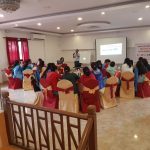Dr Huseyin Dogan (Principle Investigator) and Co-Investigators (Dr Paul Whittington, Professor Keith Phalp, Dr Nan Jiang and Dr Benjamin Gorman) from the Faculty of Science & Technology have been awarded an additional £59,578 funding from the Department of Culture, Media and Sport, in collaboration with Innovate UK and the Knowledge Transfer Network, through the Cyber Academic Startup Accelerator Programme (CyberASAP). This external funding supports BU2025 Assistive Technology Strategic Investment Area. The CyberASAP programme is designed to assist academics in UK Universities to commercialise cyber security ideas, by providing expertise knowledge and support. Lesley Hutchins (Research Commercialisation Manager, RDS) is included in our team to guide the commercialisation of Authentibility Pass through a potential BU spinout company. We also receive valued administrative support from Caroline Jarmolkiewicz, Personal Assistant to Dr Paul Whittington.
We have discovered that people with disabilities can encounter barriers due to web security and privacy technologies. This could result in them being prevented from purchasing goods or registering for services, leading to frustration and cancelling transactions. Our CyberASAP project, named Authentibility Pass, will be an innovative solution to assist people with disabilities to communicate their authentication and accessibility requirements to higher education institutions, schools, non-profit organisations, small medium enterprises and financial institutions. Authentibility Pass builds on the knowledge obtained during Dr Paul Whittington’s PhD (supervised by Dr Huseyin Dogan and Professor Keith Phalp) and postdoctoral research through the development of the SmartAbility Framework.
This funding follows our previously successful bid for Phase 1 of the programme, where we received £31,612 to develop our value proposition and to conduct market validation of our concept. We conducted market analysis and identified that there is a need for Authentibility Pass, as organisations who do not comply with accessibility regulations lose approximately £80k per annum through accessibility claims. Our market validation highlighted that people with disabilities often need to repeatedly inform organisations of their authentication and accessibility requirements. Authentibility Pass will enable customers to enter their requirements into a smartphone application, which can be stored in secure organisational databases.
During Phase 2 (which runs from September 2020 to February 2021), Vers Creative UK (CEO David Passmore) will be sub-contracted to develop the Authentibility Pass Proof of Concept, consisting of an Android application, database and web interface for managing the database. We believe that adopting Authentibility Pass will assist organisations to comply with accessibility and equality regulations, as well as facilitating awareness of the requirements of customers with disabilities when interacting with organisations. The solution will be customisable to suit specific organisations through a ‘Software as a Service’ with varying licensing options, e.g. annual subscriptions for hosting the database or one-off costs to provide an API that interfaces with existing database systems.
Our aim is to evolve Authentibility Pass into a commercial product that improves the relationship with customers, students or pupils who have reduced abilities. The CyberASAP project will culminate in a Demo Day in February 2021 at Level 39 of Canary Wharf (COVID-19 permitting), where we will present our Authentibility Pass Proof of Concept to potential investors.
 Authentibility Pass – Innovative Solution for People with Disabilities
Authentibility Pass – Innovative Solution for People with Disabilities Cross-faculty team receive CyberASAP 22-23 funding from Innovate UK to develop HEIF funded project!
Cross-faculty team receive CyberASAP 22-23 funding from Innovate UK to develop HEIF funded project!










 BU academic publishes in online newspaper in Nepal
BU academic publishes in online newspaper in Nepal Final day of the ESRC Festival of Social Science
Final day of the ESRC Festival of Social Science Using Art to enhance Research
Using Art to enhance Research Register now to attend the 17th Annual Postgraduate Research Conference – Wednesday 3 December 2025
Register now to attend the 17th Annual Postgraduate Research Conference – Wednesday 3 December 2025 ECR Funding Open Call: Research Culture & Community Grant – Application Deadline Friday 12 December
ECR Funding Open Call: Research Culture & Community Grant – Application Deadline Friday 12 December MSCA Postdoctoral Fellowships 2025 Call
MSCA Postdoctoral Fellowships 2025 Call ERC Advanced Grant 2025 Webinar
ERC Advanced Grant 2025 Webinar Horizon Europe Work Programme 2025 Published
Horizon Europe Work Programme 2025 Published Horizon Europe 2025 Work Programme pre-Published
Horizon Europe 2025 Work Programme pre-Published Update on UKRO services
Update on UKRO services European research project exploring use of ‘virtual twins’ to better manage metabolic associated fatty liver disease
European research project exploring use of ‘virtual twins’ to better manage metabolic associated fatty liver disease